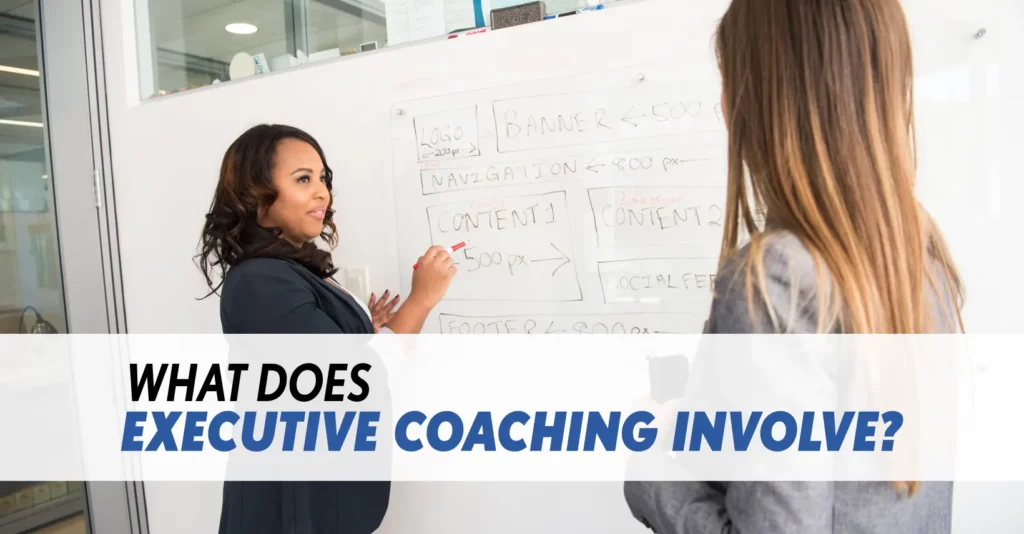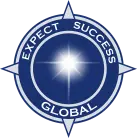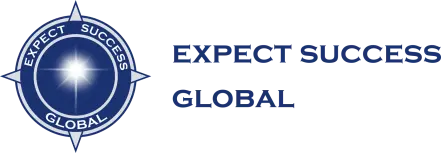
What is Executive Coaching?
Executive coaching is a specialized form of professional development aimed at enhancing leadership skills and empowering individuals to become effective leaders. This type of engagement typically involves a close and ongoing relationship between the coach and the client to support the client’s personal and professional growth.
Executive coaching services are designed specifically for senior leaders looking to improve their leadership style, enhance their decision-making abilities, and achieve their development goals. By providing guidance, feedback, and support, executive coaches help their coaching clients develop a growth mindset, overcome obstacles, and reach their full potential as leaders. This can lead to improved job satisfaction, increased employee retention, higher customer satisfaction, and continued success for both the individual and the entire organization.
Benefits of Executive Coaching
Executive coaching involves a structured and collaborative process designed to help senior leaders enhance their leadership skills and reach their development goals. It offers numerous benefits to individuals and organizations, resulting in a significant positive impact.
One of the significant benefits is its ability to improve leadership skills. Through tailored sessions, clients can better understand their strengths and weaknesses, enabling them to make more informed decisions and lead their teams more effectively. Additionally, it cultivates self-awareness, helping them recognize their blind spots and work on personal growth.
Furthermore, it often has a direct impact on employee retention. By investing in the development and growth of their leaders, organizations demonstrate a commitment to their employees’ personal and professional well-being. This fosters a positive organizational culture, leading to higher job satisfaction and longer-term success for both individuals and the entire organization.
In addition to improving leadership skills and employee retention, it helps leaders develop compassion for others. Coaching encourages individuals to empathize with their team members and consider different perspectives, leading to better collaboration and increased employee engagement.
Organizations can consider partnering with a coach to fully capitalize on the benefits of executive coaching. A coach specializes in helping coaching clients think critically, challenge assumptions, and develop innovative solutions to move the business forward. Organizations can unlock their full potential and achieve sustainable organizational success by harnessing the power of executive coaching.
Types of Coaching Services
Various types of coaching services are available to cater to individual’s and organizations’ unique needs and goals. Regardless of the type, these services provide individuals and organizations with powerful tools, support, and guidance needed to achieve their development goals and enhance their overall success.
Executive Coaching Programs
Executive coaching programs offer specialized services designed to enhance executives’ skills, abilities, and overall performance. These programs aim to support the development and growth of effective leaders within an organization, helping them reach their full potential.
One type of program is business coaching, which focuses on improving executives’ business acumen and strategic thinking. This program helps leaders develop a more robust understanding of their industry, improve decision-making skills, and enhance their ability to drive business growth.
Another program is leadership coaching, which refines leadership skills and qualities. Executives engage in this program to enhance their ability to inspire and motivate their teams, improve communication and interpersonal skills, and develop a more effective leadership style.
Career development coaching is a program that assists executives in identifying and achieving their professional objectives. It helps them create a clear career path, set goals, enhance their networking skills, and navigate their careers to attain long-term business success and job satisfaction.
Personal development coaching focuses on the growth and development of executives on a personal level. This program addresses work-life balance, stress management, emotional intelligence, and personal well-being, enabling executives to thrive personally and professionally.
Overall, executive coaching programs offer a range of specialized services tailored to the specific needs of executives. These programs enable individuals to enhance various aspects of their professional and personal lives, ultimately leading to growth, success, and fulfillment.
To read more about different types of programs, visit our article Executive Coaching: What It Is And How It Can Help You.
Styles of Coaching Programs
There are a variety of methods to conduct coaching. Each style still focuses on different aspects of personal and professional development. These programs employ different approaches and cater to the needs of individuals, teams, and businesses.
- Individual Coaching: Individual programs help individuals achieve personal goals, enhance skills, and overcome challenges. Coaches work one-on-one with clients to identify their strengths, clarify their values, and create actionable plans for personal growth and continued success. This is usually the quickest way to see results, as the focus is entirely on your needs.
- Group Coaching: Group coaching programs aim to optimize performance in a group setting. Coaches work with the entire group to improve collaboration, communication, and problem-solving skills. This program fosters a positive culture, supports individual development within the group, and enhances the overall sense of community. Working with others creates a sense of group accountability and provides ample opportunities for brainstorming among the participants.
- Business-Partnership Coaching: Business-Partnership Coaching programs target multiple individuals in the same business, possibly including owners, executives, and other business leaders, to help them navigate their professional challenges and achieve their business objectives. Often, a business will partner with a coach or coaching company and offer coaching to a select few individuals. Coaches focus on strategic planning, leadership development, and enhancing business skills. They work with multiple key members to develop effective business strategies, improve decision-making processes, and create a vision for long-term business success.
Each type of program offers specific benefits and addresses unique development areas. Whether personal growth, group dynamics, or business strategy, these programs provide individuals, teams, and businesses with the support and guidance needed to achieve their goals and reach their full potential.
The Process Of Executive Coaching
Executive coaching involves a systematic approach to helping senior leaders and executives develop leadership skills and maximize performance. It typically begins with a thorough assessment of the individual’s current leadership capabilities, strengths, and areas for improvement. This assessment establishes specific goals and objectives, focusing on areas such as effective communication skills, decision-making, strategic thinking, and emotional intelligence.
The coach then works closely with the executive, providing guidance, support, and feedback to help them enhance their leadership style and effectiveness. This often includes regular sessions, where the coach and the executive engage in conversations, reflections, and action planning. Throughout the engagement, the coach also acts as a sounding board, helping the executive explore new perspectives and challenging their assumptions. The ultimate goal is to enable the executive to unlock their full potential, become more self-aware, and achieve their professional development goals, ultimately benefiting both the individual and the organization.
Establishing the Relationship and Agreement Between the Client and Coach
Establishing a solid relationship and agreement between the client and coach is crucial for the success of the engagement. Building mutual trust and rapport lays the foundation for a productive and effective experience.
The first step is arranging a meeting between the coach and the candidate. This meeting allows both parties to get to know each other, discuss the goals and objectives, and ensure a good match between the client’s needs and the coach’s expertise. It also allows the client to ask any questions they may have and evaluate the coach’s style and approach.
Once the decision to move forward is reached, they both will work together to establish an agreement. This agreement outlines the scope of the engagement, the specific goals and outcomes the client wants to achieve, and the expected duration and frequency of sessions. The agreement also clarifies the roles and responsibilities of both parties involved, ensuring a shared understanding of how the executive coaching process will unfold.
The coach focuses on building a trusting relationship with the client throughout the engagement. This involves maintaining confidentiality, demonstrating empathy, and creating a safe and non-judgmental space for the client to share their challenges and aspirations. Building mutual trust and rapport allows the client to feel comfortable and supported, facilitating open and honest communication and maximizing the impact of the coaching.
Setting Goals and Developing an Action Plan for Achieving Them
Setting goals and developing an action plan are fundamental aspects of executive coaching. Executive coaches are crucial in helping clients set specific, measurable goals and creating strategies to achieve them.
Through careful exploration and dialogue, coaches work with clients to identify and clarify their goals. These goals range from improving leadership skills and enhancing effective communication to increasing productivity and efficiency. Once the goals are established, the coach guides the client in creating an action plan.
The action plan involves breaking down the goals into smaller, attainable steps. Executive coaches help clients develop strategies for building new skills, overcoming obstacles, and measuring progress. They provide guidance and support in identifying relevant resources, acquiring necessary knowledge, and developing the required competencies.
By setting measurable goals, clients clearly understand what they want to accomplish, which helps maintain focus and motivation throughout the process. Moreover, setting goals allows clients to measure their progress and celebrate achievements, boosting confidence and job satisfaction.
The benefits of setting goals are numerous. It enables clients to succeed faster as they have a clear roadmap. It also encourages clients to push themselves beyond their comfort zones and aspire to achieve more. Setting goals and developing an action plan sets the stage for growth, development, and continued success.
Assessments and Evaluations to Obtain Insight into Client’s Needs and Challenges
Assessments and evaluations are crucial as they offer valuable insight into clients’ needs and challenges. These processes provide a comprehensive understanding of an individual’s strengths, weaknesses, and areas for improvement.
Through assessments, coaches can gather data on various aspects, such as leadership skills, communication styles, and emotional intelligence. This information helps them identify specific challenges and areas that need attention. By analyzing the results, they gain a deeper understanding of clients’ strengths and weaknesses, enabling them to tailor strategies to address these specific needs.
Evaluations are equally crucial in an effective engagement as they allow coaches to measure progress and determine the effectiveness of the coaching interventions. By conducting periodic evaluations, they can assess the impact of their efforts, identify any gaps or roadblocks in the process, and make necessary adjustments to ensure continuous improvement.
By incorporating assessments and evaluations, executive coaches can provide their clients with more targeted and practical support. This personalized approach enhances the experience and helps clients achieve their goals more efficiently. Ultimately, assessments and evaluations are powerful tools to obtain insight into their client’s needs and challenges, fostering a more fruitful engagement.
Developing Strategies for Improved Performance, Communication, or Conflict Resolution
Executive coaching is crucial in enhancing performance, improving communication, and facilitating conflict resolution within organizations. Through various strategies, executive coaches help clients identify areas for growth and develop effective strategies to address these challenges.
Communication techniques are a vital aspect of executive coaching. Coaches help individuals develop practical communication skills, enabling them to convey their ideas, expectations, and feedback more clearly and confidently. Through role-playing exercises, active listening techniques, and providing constructive feedback, they assist leaders in honing their communication abilities.
Conflict resolution strategies are also integral. Coaches help leaders identify and address conflicts within their teams or organizations in a constructive manner. They guide their clients in understanding the root causes of conflicts, fostering open dialogue, and facilitating effective problem-solving techniques. Leaders can create a more harmonious and productive work environment by developing conflict resolution strategies.
Examples of techniques and approaches used in executive coaching engagements include providing constructive feedback, promoting self-reflection, encouraging emotional intelligence, and fostering a growth mindset. These techniques empower leaders to develop new approaches, overcome obstacles, and drive positive change.
Regular Sessions to Monitor Progress and Make Adjustments as Needed
Regular sessions are essential to the executive coaching process. These sessions provide a structured framework for monitoring progress and making necessary adjustments to achieve the desired outcomes.
During these sessions, coaches work closely with their clients to explore and identify goals, develop action plans, and assess progress. They use various key tools and techniques to gather data, evaluate performance, and measure the impact of the engagement.
Regular sessions serve as opportunities to provide ongoing feedback, support, and accountability. Coaches offer constructive feedback and guidance to help clients identify their strengths, overcome challenges, and make improvements. They provide a safe and non-judgmental space for clients to reflect, explore new perspectives, and gain insights into their behavior and thought patterns.
They also offer support and encouragement, helping clients stay motivated and focused on their goals. They provide resources, key tools, and strategies to enhance learning and skill development.
Furthermore, regular sessions allow coaches to hold clients accountable for their commitments and actions. Through open and honest discussions, they help clients stay on track, address any obstacles or resistance, and make necessary adjustments to their plans.
How to Find a Good Coach
Finding an exemplary coach is a vital aspect of effective executive coaching. Performing preemptive research before speaking with a potential coach is the most effective way to start this journey.
Look at Past Testimonials
When searching for an excellent executive coach, it is essential to look at past testimonials to ensure their effectiveness and ability to deliver results for clients. Past testimonials serve as valuable insights into their track record and indicate their expertise and professionalism.
By reading past testimonials, you can understand how they have helped previous clients and the specific outcomes achieved. This can give you confidence in their ability to assist you in reaching your goals and making positive changes in your professional life.
Testimonials also give you a glimpse into their process and coaching style. You can learn about their communication skills, ability to establish a trusting and productive relationship, and approach to addressing challenges and overcoming obstacles.
Moreover, past testimonials provide a sense of credibility and reputation within the field. Positive feedback from satisfied clients can serve as a validation of their expertise and the value they provide.
Schedule a Time to Talk and See if They’re a Good Fit For Your Needs
When seeking the services of an executive coach, it is essential to schedule a time to talk with potential coaches to determine if they are a good fit for your needs. During this initial conversation, you will have the opportunity to assess their compatibility and clarify your requirements.
Scheduling this discussion allows you to gauge whether they understand your specific challenges, goals, and aspirations. It also provides an opportunity to discuss their approach and methodology, ensuring it aligns with your needs. Additionally, this conversation serves as a platform to inquire about their qualifications, experience, and expertise.
By engaging in this initial discussion, you can evaluate their communication style and interpersonal skills, which are crucial for establishing a productive relationship. It is essential that you feel comfortable and connected, as this will significantly contribute to the success of the engagement.
At Expect Success Global, we understand that finding the right coach can be a daunting task. That’s why we offer assistance matching you with the right coach based on your unique needs and requirements. Schedule a time to talk with us, and let us help you find the perfect executive coach to support your professional development and leadership growth. Visit our website or contact us to set up a conversation and take the first step toward your coaching journey.
Schedule A Free Coaching Call



